“The most important item over time in valuation is obviously interest rates,” Warren Buffett explained in 2017. Never mind that this appears to contradict his beliefs back in 2001.
Sixteen years earlier, Mr. Buffett stated that stock market-capitalization-to-GDP was “the best single measure of where valuations stand at any given moment.” On this indicator, then, stocks have rarely been as over-priced as they are right now.
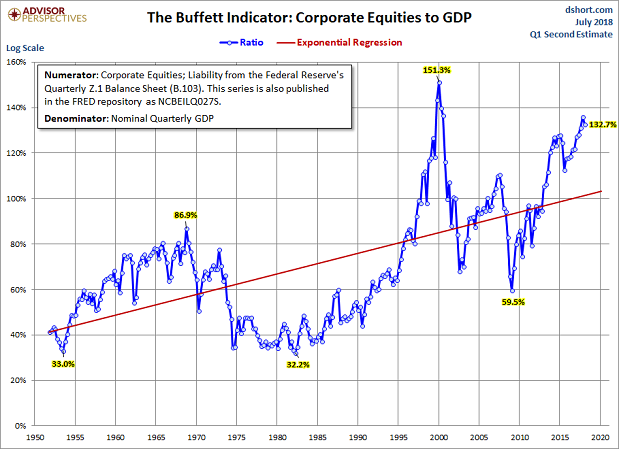
It is certainly possible that the financial crisis of 2008 fundamentally altered the investment game. In particular, Mr. Buffett may be changing with the times, recognizing that central bank manipulation of borrowing costs is the primary determinant for stock price appreciation (or depreciation).
For the moment, then, let’s assume that ultra-low interest rate policy is the main reason for the stock market’s lengthy uptrend. Whether the stock uptrend has prospered because consumers could buy more cars and more homes with those lower rates, or whether the stock uptrend has its roots in corporations borrowing money to buy back shares of their own stock, or whether the stock uptrend has persisted because the federal government has been using negative real rates to spend trillions and trillions with reckless abandon, the premise remains the same; that is, easy-to-access, low-cost credit now goes hand-in-hand with higher stock prices.
If the premise is accurate, it would seem that certain sectors of the economy would be more critical for bull market continuation. For example, “too-low-for-too-long” Federal Reserve rate policy began taking its toll on financial institutions in late 2006 and 2007, well before the 2008 broad market collapse.
It follows that investors may want to question the durability of the current stock market bull. Can it really succeed “ex-financials?”
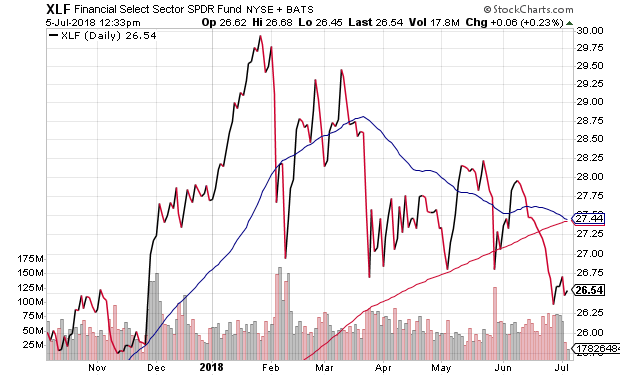
In the chart above, the SPDR Sector Select Financials (XLF) is below its 200-day moving average. Moreover, the 50-day is set to cross below the 200-day (a.k.a. “death cross”). And the price itself is 11.2% off of a January peak that had been reached more than five months ago.
What about the home builders? Perhaps the breakdown in the SPDR S&P Homebuilders ETF (XHB) is an early indication of what will happen to the broader stock market if borrowing costs continue to rise, pricing out new home buyers.
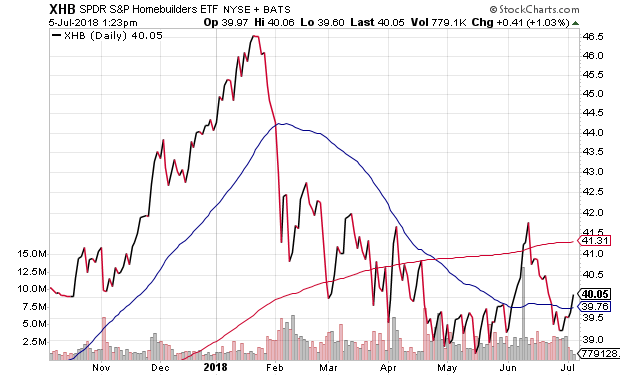
Clearly, there are other signs of tear and wear. Both the Dow Jones Transports as well as the more widely followed Dow Jones Industrials Average finished the month of June below respective 200-day moving averages.
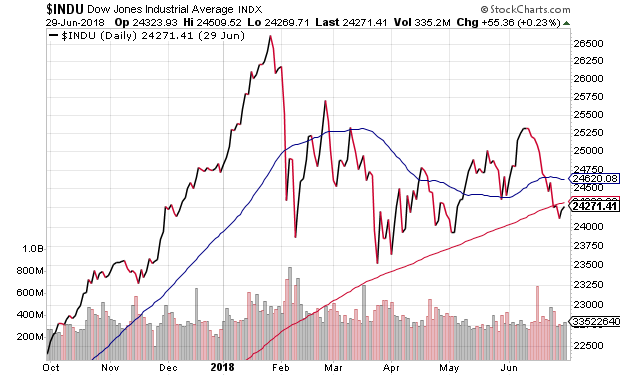
It is worth noting that diversification has not been helpful in 2018 either. Dividends (SPDR S&P Dividend (P:SDY_OLD) SDY), bonds (Vanguard Total Bond Market BND) and international stocks have all struggled.
The primary path to success so far? Exposure to tech-oriented and growth-oriented securities in funds like Vanguard Growth (VUG), iShares Russell 1000 Growth (IWF) and SPDR S&P 500 Growth (SPYG).
In the chart below, one can see the progress for one area of the market via Vanguard Growth (VUG). One can also see the strain that much of the rest of the market is facing.
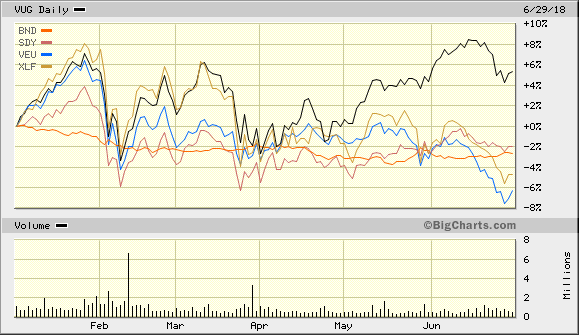
On the plus side for stocks, the domestic economy has performed admirably and corporations have demonstrated how the recent tax cuts have made them more profitable. Similarly, those companies have been gobbling up shares of their own stock with the tax cut cash, providing a significant tailwind for investment portfolios.
Indeed, if the economic environment remains relatively robust, if trade friction subsides, and if the Federal Reserve does not overplay its rate hiking/balance sheet reduction hand in pushing up borrowing costs, stocks could surge. Yet these wish-list items are not necessarily high probability outcomes.
Granted, there seems to be universal acclaim for how well the domestic economy is performing at this moment. Less discussed, however, is that asset prices in this century have been driving the economy, not the other way around. (Note: I wrote about this concept in great length in previous commentary.)
By way of review, the economy had been considered vibrant when the tech bubble burst in March of 2000. Stock price collapse and dot-com corporate layoffs eventually weighed on a economy that went into recession a full year later (March 2001). The tech balloon bursting led to economic doldrums and eventual contraction in the economy, not the other way around.
Similarly, there were very few economists who predicted a recession at the start of 2008. In spite of subprime. In spite of yield curve inversion in 2006. And in spite of the National Bureau of Economic Research (NBER) reporting in December of 2008 that a recession began in December of 2007.
What did happen, though, was that housing prices began descending in mid-2007 and stock prices began falling in October of 2007. As those declines began picking up speed — as asset prices fell harder and harder — so went the economy.
The point? You may be far better off watching asset price movement for clues on the ultimate well-being of the economic landscape.
As always, I will be watching time-tested tools like the monthly close on the 10-month moving average. The green light for stocks may still be intact. Still, I am ready to lighten up considerably if the monthly close for the S&P 500 falls below its trendline.
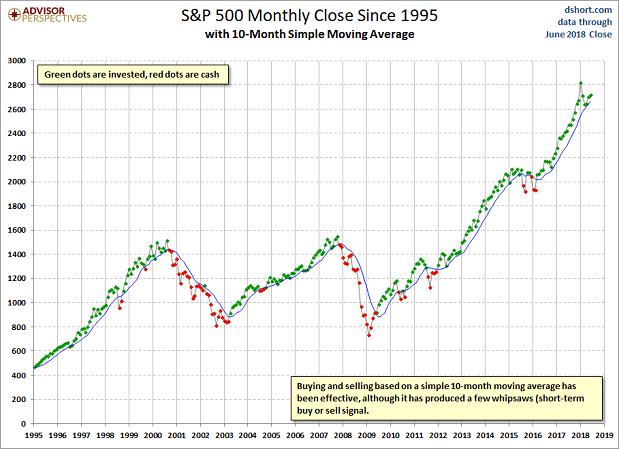
Disclosure Statement: ETF Expert is a web log (“blog”) that makes the world of ETFs easier to understand. Gary Gordon, MS, CFP is the president of Pacific Park Financial, Inc., a Registered Investment Adviser with the SEC. Gary Gordon, Pacific Park Financial, Inc., and/or its clients may hold positions in the ETFs, mutual funds, and/or any investment asset mentioned above. The commentary does not constitute individualized investment advice. The opinions offered herein are not personalized recommendations to buy, sell or hold securities. At times, issuers of exchange-traded products compensate Pacific Park Financial, Inc. or its subsidiaries for advertising at the ETF Expert website. ETF Expert content is created independently of any advertising relationship.
